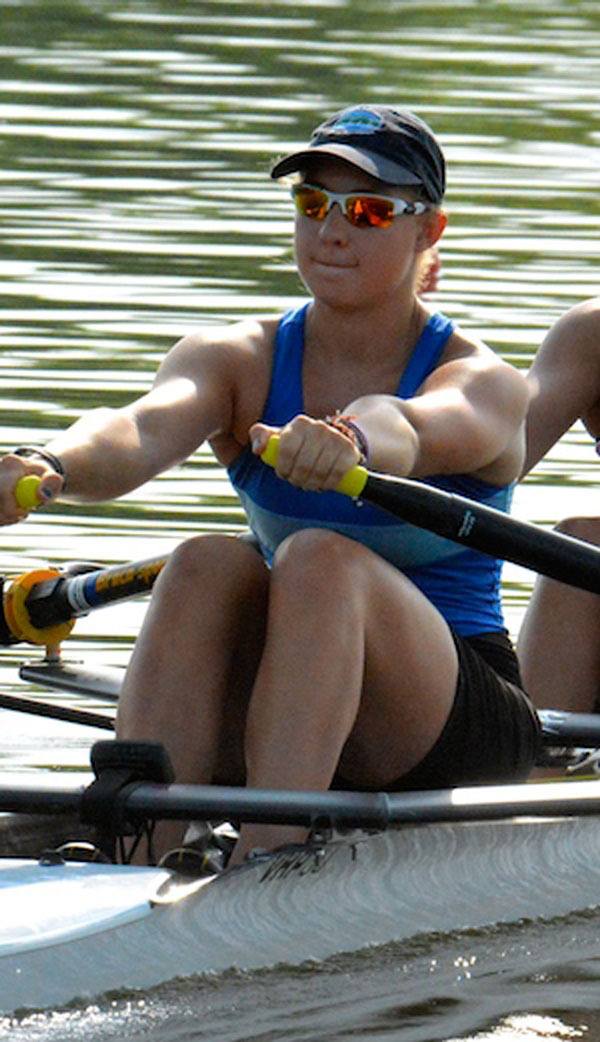Two years in and Elise Beuke, 18, now ranks among the best rowers under 18 in the world.
She took seventh with double scull partner Isabella Strickler (Grosse Pointe, Mich.) at the World Rowing Junior Championship in Rio de Janeiro, Brazil, last weekend.
They went 7:22.99 in the B Finals on Aug. 8, significantly improving on their preliminary heat (7:31.31) and repechage (7:41.40) times.
In the semi-finals on Aug. 7, Beuke and Strickler finished in fourth place (7:31.60), behind Germany (7:21.13), Italy (7:24.09), and Hungary (7:27.18). Germany’s Annemieke Schanze and Frieda Haemmerling won the A Finals on Aug. 8 with a time of 7:32.580.
For the B Finals, Beuke and Strickler outpaced runner-up Russia by just under six seconds in the heat.
Beuke’s Team USA teammates did quite well, too.
Two incoming rowers to the University of Washington and Beuke’s teammates in the fall, Marlee Blue and Katy Gillingham, both from Holy Names Academy, were part of the U.S. fours team to win a gold medal at the championships. As a whole, the U.S. team earned five medals, which is the most ever by the U.S.
The U.S. team along with other racers ran into some adversity though.
Wind conditions pushed the event, expected to run through Aug. 9, up one day, said John Halberg, president of the Olympic Peninsula Rowing Association, so Beuke and Strickler did their preliminary race on Thursday morning and their repechage in the afternoon.
Elise’s dad, Todd Beuke, said he spoke to her a few times during the two-week span she was in Brazil and that prior to the races she was feeling ill.
The Associated Press reported on Monday, Aug. 10, that 13 Team USA junior rowers and four staff became ill with gastrointestinal issues possibly from pollution in the Rodrigo de Freitas Lake where they all competed. The lake has come under scrutiny recently for its pollution as it will host the 2016 rowing competition for the Rio Summer Olympics.
Todd Beuke said Elise missed the opening ceremonies because she wanted to rest.
However, as the competition progressed, Beuke and Strickler recorded faster times, which Todd said might be attributed to the weather, Elise feeling better and because she promised him she’d go faster on his birthday on Saturday.
The event was televised locally so any opportunity to watch Elise compete came in front of a computer screen on Brazilian time, four hours ahead, with coverage beginning at 5 a.m.
Todd said despite his family not being able to go, the event was streamed online with GPS tracking in each boat showing an icon on a map with live commentary.
What made the experience even more special, he said, was seeing Elise in a USA uniform in online photos.
“I knew I would be proud of that but didn’t know it’d be that big of an emotional high,” he said.
Halberg said this experience for Elise, who started rowing with the Olympic Peninsula Rowing Association between her sophomore and junior years, is significant.
“What an experience for Elise to be in the world competition with 18 countries’ best athletes,” he said.
“It’s also not only her success but also (Rodrigo Rodrigues’) success (her coach on the local team who also co-coached the U.S. World team). His success shows our rowers that what Elise did is something we can achieve here.”
Rodrigues, a Brazilian native, will remain in Rio De Janeiro through Aug. 18 and Elise returned on Aug. 11. She’ll compete with the UW Rowing Team in the fall while attending school.


